What does the future hold for the natural products industry?
Here are some key predictions.

I was wrong about what each of our grown kids would choose as their path in life. I’ve never won a Super Bowl pool or picked a winning horse. My lottery numbers have yet to yield a winning ticket, and I certainly can’t call a presidential race. All in all, as a prognosticator of the future, I stink. However, that does not discourage me from giving it a go. I thought I’d share my thoughts as to the changes that have come or will come as a result of this crazy, tragic period we are all in at the moment. I will start with the bleak and brighten my outlook as the article progresses. I invite you to share your thoughts as well.
This or similar will happen again.
Sadly, this will happen again. Whether it is a new wave of this virus or a completely new one, we will be back here. We live in an interconnected world, and while there are so many positives that come out of our interconnectedness, global pandemics will be one of the adverse outcomes. As a founder, you better ensure your business is built to withstand this likelihood.
The valley of death just got deeper and wider.
The funding gap has been growing, and COVID-19 is only serving to exacerbate the issue. Emerging brands are going to need to go further on less than they have ever have before. They will be forced to traverse a deep, vast chasm between their seed round and their series A. The traction, revenue and proven scalability that will be demanded before they are deemed investment-ready will put a lot of pressure on young brands and their founders.
The failure rate will increase.
See above. At this moment there are a lot of brands in the middle of that valley. And because the valley just got deeper and wider, many will be caught there without the provisions they need to make it to the other side. I wish it weren’t true, but I believe it to be. If you are there and you’re less than halfway, consider turning back. Adjust your go-to-market strategy, get smaller, nimbler and read what is written below.
Capital efficiency is the new velocity.
For years, the industry has put a premium on velocity: the numbers of units per SKU, per store, per week your product sells. Well, I am here to tell you that velocity’s reign has ended. The new queen is capital efficiency. Brands that use their cash wisely, have less fixed costs, have a short cash conversion cycle and have sound unit economics will win the day.
Regional and super-regional brands make sense.
Not every brand has to be built for a big exit, nor do they need to be a national superpower. Strong regional and super-regional brands that are omnichannel, capital efficient and have a strong evangelical following can become businesses that are investment-attractive, profitable and rewarding.
E-commerce enablement will be a must.
Every brand will need to be available online. Consumers will insist. Even those that are refrigerated and frozen. The good news there is that those costs have come down. You can either stick to a core region or build a 3PL network that will put you within two days via ground shipping of the vast majority of your consumers. Future innovation, packaging, etc., should be designed with e-commerce in mind.
Retail isn’t going anywhere, but it will change, and so should your thinking.
Retail is not going to go anywhere. It will remain the way most consumers get their groceries. Stores will change, the center is likely to get smaller. There will be more focus on experiential shopping around the perimeter. But, for the most part, a trip to the grocery store will still feel like a trip to the grocery store. It is your thinking that really needs to be adjusted. Go back and read my comments on capital efficiency. Brands should take a curated and disciplined approach to retail. Finding a select few that, as Corrinne Shindelar of INFRA states, will serve to “showcase” your products.
Driving discovery and trial will look different.
E-commerce and alternative channels such as corporate campuses, colleges and universities and hospitality/travel will be where most new brands go to drive discovery. Moving closer to where the problem being solved is most pronounced or the need being met is most acute just makes good sense.
Building a digital tribe will be a priority.
A tribe of loyal, motivated consumers is and will continue to be a must. It is always hard to show a direct ROI for social media spend. However, having a direct line to your consumers is critical and being able to demonstrate that will be a crucial decision factor used by buyers going forward.
There will be a wave of new entrepreneurs.
Don’t rest on your laurels. A lot of birds just got shaken out of their nest. The next wave of entrepreneurs is coming, and they will be building digital-native brands. Take action now so you don’t get passed up.
Personal accountability for health, wellness and hygiene will increase.
There is no doubt in my mind that there is a heightened awareness about our roles in our own personal health, wellness and hygiene. This growing awareness will change the products we buy and how and where we buy them. As a founder of any early stage brand, it is incumbent upon you to recognize this seed change and adjust your messaging, your route-to-market and more to account for this shift in consumer preference.
The natural products industry will be healthy and positioned for continued growth.
I end my soothsaying words with this final prediction. Our industry will experience continued and sustained growth. I doubt that any other sector of the economy emerges as well-positioned as ours. I count my blessings every day that I work in this industry.
Be well.
Elliot Begoun is the founder of TIG, a practice focused on helping emerging natural product brands grow. TIG positions CPG brands to raise capital, prove velocity, gain distribution and win market share.
Have some big ideas or thoughts to share related to the natural products industry? We’d love to hear and publish your opinions in the newhope.com IdeaXchange. Check out our submission guidelines.
About the Author(s)
You May Also Like




